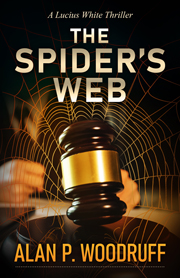The Spider’s Web
 Lucius White was lucky to be alive. Thirty years as a criminal defense attorney have taken their toll. His heart attack should have been a warning. And it had been — until state senator Clark Shepard was accused of murder. White knew representing Shepard was a mistake. Shepard was a friend. They were too close. White could not be objective. But when it became apparent that Shepard was being set up by his political opponents, White knew he didn’t have a choice. As White investigates the charges against Shepard, he is drawn into a world where political corruption rules, where the line between prosecutors and criminals blurs, and where no one can be trusted — not even the judge. A tangled web from which there is no escape.
Lucius White was lucky to be alive. Thirty years as a criminal defense attorney have taken their toll. His heart attack should have been a warning. And it had been — until state senator Clark Shepard was accused of murder. White knew representing Shepard was a mistake. Shepard was a friend. They were too close. White could not be objective. But when it became apparent that Shepard was being set up by his political opponents, White knew he didn’t have a choice. As White investigates the charges against Shepard, he is drawn into a world where political corruption rules, where the line between prosecutors and criminals blurs, and where no one can be trusted — not even the judge. A tangled web from which there is no escape.
Hate! Profound and permeating!
For thirty years, it has driven me; the engine powering my passion. For thirty years, it has gnawed at me; a beaver attacking the birch tree of my soul.
I’m an attorney, a criminal defense attorney, and I love the law. But I hate the criminal justice system. I hate the inequities of the system. I hate that the system is rigged to favor the government. I hate prosecutors who value convictions over justice.
I’ve hated the so-called justice system since I was a child, and the events that spawned my hate are never far from my mind. The battering ram shattering the door of our ranch house. Armed troops flooding the room. Rifles pointed at everyone. My father being dragged away in handcuffs.
I wasn’t permitted to attend the trial, but I knew all about it. The fabricated testimony of paid informants. The questionable authenticity of documents offered by the government.
I worshiped my father and never doubted the rightness of his cause as leader of the Idaho militia movement. He said the government was wrong—and I believed him. He said the government wanted to stop him—and he was right. He said the prosecutors wanted him in prison and weren’t concerned with how they got him there—and that is what happened. When he was murdered by another inmate, I knew I had to devote my life to righting the wrongs of the criminal justice system.
I know the public doesn’t think highly of criminal defense attorneys. They think we’ll do anything to win, and they’re generally right. Most defense attorneys are just as bad as prosecutors. For most of them, truth is meaningless. Only the results count.
I couldn’t let myself become like them. That’s not what my father would have wanted. I had to be the man in the white hat. The defender of the system.
By any standard—money, reputation, accomplishments—I’ve been a success, but the line between representing my clients and pursuing my crusade has become blurred. Now, every prosecutor has an evil heart. Every case is personal. Every client is a cause. And the battles have exacted a heavy price.
My heart attack should have been all the warning I needed—and for a while it was. But hate is a powerful force, and the courtroom is a seductive mistress.
Even before I agreed to represent Clark Shepherd, I knew it was the wrong decision. Clark was a friend, and it’s never a good idea to represent a friend in a criminal case—especially a capital murder case. There’s too much at stake, and it’s too easy to believe what your client tells you. An attorney who doesn’t question everything isn’t doing his job, and his client pays the price.
There were other reasons, personal reasons, why I shouldn’t have agreed to represent Clark. But dealing with them meant questioning things about myself, things I didn’t want to face. I didn’t know if Clark was guilty or not, and I didn’t want to know. My job just was to make the system work. Clark knew that when he came to me. He knew it when I told him I shouldn’t represent him.
I resisted his pleas until I realized he was more than just a defendant; he was a victim of everything I hated about the system. Besides, I owed Clark. If not for him, my heart attack would have killed me.
Now, I was caught in the spider’s web, and Clark’s life was in my hands.
A simple “not guilty” was not enough—not for Clark. His political future required complete exoneration—in the court of public opinion as well as the courtroom—and he expected me to deliver it.
Acid flooded my stomach.
My heart pounded.
Clark’s trial was going to begin in less than ten hours, and I still didn’t know how I was going to save him.
Santini. Cristoforo Santini. He was the key. If only . . .
But I’m getting ahead of myself.
